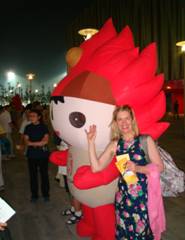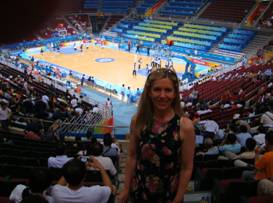
The Beijing Games were billed as the world's first web 2.0 Olympics -- the time when social networking over the Internet and video streaming would shine as they reflected China's glory of hosting this grand event. But I found it not so.
Facebook was slow and often not accessible. Email was unreliable and often stopped for up to eight hours, then it would suddenly pour into my Outlook In box all at once, in a virtual avalanche. The Internet was moving at a crawl. Too many office workers were tuning into live broadcasts from the Web such as those delivered by video streaming service PPLive, a Chinese startup funded by venture capital investors I know in Shanghai. PPLive was the only way I had the chance to see the Olympics live, and that was pretty challenging. I had to guess which Chinese characters represented which commands, like "play." NBC television could not be seen in China since it's the Chinese government's CCTV that has the rights to broadcast the games in the Mainland.
Some web sites remained blocked. Hotmail was certainly not hot, but cumbersome to log into from China. Even the much-promised 3G or third generation mobile phone service was not widely accessible during the Games, although text messaging worked OK. High-speed wireless Wi-Fi service to access the Internet was supposed to be there in abundance but I could never get a strong signal. Maybe there were already too many people on the network at the same time. So how to stay connected with contacts while at the Olympics?
 I tried out the microblogging service Twitter, and liked it for its instant gratification. I communicated with friends and colleagues over the fast-paced text messaging system. It even became my best source of real-time news through a tag #080808, specifically set up to follow the action during this period of the Olympics.
I tried out the microblogging service Twitter, and liked it for its instant gratification. I communicated with friends and colleagues over the fast-paced text messaging system. It even became my best source of real-time news through a tag #080808, specifically set up to follow the action during this period of the Olympics.
When the lip-synching was uncovered at the opening ceremony, Twitter bloggers were all over the news. That's where I first read about it. When China's gold medal hope Liu Xiang withdrew from the road and track competition, I heard about it first on Twitter. Thanks goes to that group of "Twitter'ers" who joined together to create an Olympics series of "tweets." Even the Today Show was on Twitter, and I followed their updates regularly to see what was happening at the Olympics Green. An editor invited me to stop by the set one night, a message delivered to me by Twitter.
 But the Games made up for all that was lacking in communications. I was in the newly built basketball stadium when the women's U.S. team trounced the players from South Korea. Horray! See photo snapped inside the arena on www.silicondragon.blogspot.com.
But the Games made up for all that was lacking in communications. I was in the newly built basketball stadium when the women's U.S. team trounced the players from South Korea. Horray! See photo snapped inside the arena on www.silicondragon.blogspot.com.
Soon, I am exiting from the Bird's Nest and flying home. It is with regret that I leave. Beijing has been just great without pollution, crowds and traffic jams.
See the blue skies and empty roads I am leaving on www.silicondragon.blogspot.com. I took this blue-sky photo on 8-18-08 from the apartment where I was staying in central Beijing.
At least the Chinese government did deliver on its promise to have mostly clear skies during the Games.

For more Game comments and photos, see www.silicondragon.blogspot.com.